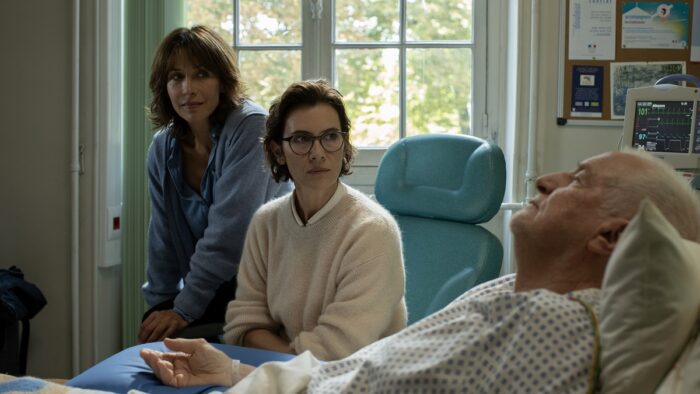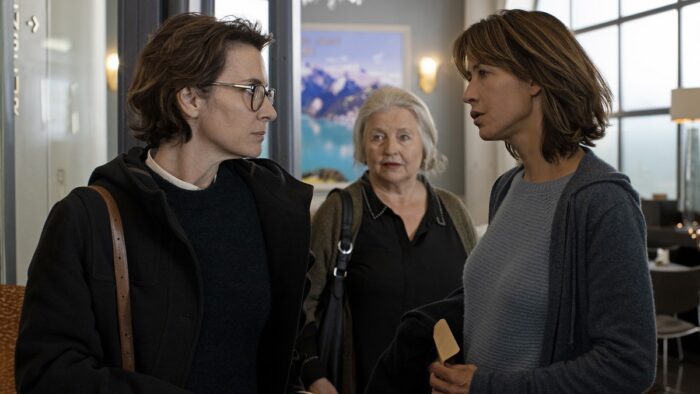In Everything Went Fine (Tout s’est bien passé), many things do not go well, which makes for a marvelously complex, sometimes comic, often touching, and ultimately insightful tale of approaching death with dignity. The slightly ironic title hints that a plan to end one’s life, no matter how confidently concocted, will not necessarily be universally accepted, nor even warmly embraced by one’s loved ones. Adapted loosely from Emmanuèle Bernheim’s semi-autobiographical novel by director-writer François Ozon with a sure hand and featuring a crackling cast, Everything Went Fine explores its subject of assisted dying with an uncommon directness and intelligence in a warm if unsentimental drama.
The film begins with a phone call. Emmanuèle (Sophie Marceau), a writer, is interrupted with the news that her father, 85-year-old André (André Dussolier), has suffered a stroke. His speech, affect, and intellect are impacted, and his prospects for a full recovery are dim. Over the next few months, Emmanuèle—“Manue,” André calls her—and her younger sister Pascale (Géraldine Pailhas) supervise André’s slow, painful recovery as he struggles to regain his basic functions. It’s a challenge for the fiercely independent old art dealer, used to his own independence and success, now bedridden and barely able to speak. The daughters too are troubled to see their father suddenly so compromised, though their upper-class lifestyles and secure finances allow them, at least, access to quality care.

The Bernheims are Jewish Parisians unencumbered by economic worries or religious dogma, moving freely about artsy social circles and fancy restaurants. Of course, in any family, old rivalries and tensions can be brought to the fore by trauma, and those of the Bernheims are no exception. The two daughters, even though each had her own conflicts with her father, want their mother and André’s estranged wife (Charlotte Rampling) to join them in the process, but she is addled by Parkinson’s—and for some barely-occluded reasons of their father’s, no longer welcome in his life. Post-stroke, André’s speech, as is the case for about a third of stroke victims, is impaired, and in his case tends to the blunt: “You were an ugly child,” he tells the exasperated Manue. At other moments, he castigates her, as he did when she was a child, for her appetite. Even a little joke like “You’re my favorite son” simultaneously digs at her tomboyishness and insults his only, estranged son.
There is, after a time, some progress in André’s condition, and with it, just enough for him to make a decision: he wants to end his life, in his own way and time, and to do so, he will need Manue’s help. He asks her, he says, because he knows she will accede to his wishes; the younger, more emotional Pascale might balk. The request is doubly difficult, forcing Manue to shift her focus from her father’s recuperation to reconciling her complex past in anticipating his passing—and at the same time to navigating what are an equally complex web of bureaucratic obstacles to achieving André’s desired outcome.
In France, assisted dying remains a vexing, legally entangled subject, and so the Bernheim daughters—Manue, mostly, with Pascale at times in tow and the third sibling, the estranged brother, hanging around the periphery—establish a plan to send André to Switzerland, where an established facility will enable his death. There are, given Andre’s increasingly loose lips about the subject and the hostility with which French authorities regard the act, a number of hitches in the plan. Aside from a mildly slapstick scene involving two men, a wheelchair, and a too-small elevator lift, the comic moments are mostly limited to moments of small surprise and outbursts of André’s slowly-returning mordant wit.
The Swiss facility does not actually administer the fatal solution that will end life. And they are careful not to let others, like the sisters, do so, for fear of their prosecution. Rather, they say, they instruct and then provide. The final decision must be André’s alone, as must be the final act. Hanna Schygulla, the Fassbinder icon, plays the facility’s representative with a soothing, beatific calm befitting her unusual assignment.

Schygulla and the major players are all expertly cast. Marceau, one of France’s most beloved actors since her 1980s debut, has the major task of carrying the film and is in nearly every scene. That her character is, by trade, a writer suggests her emotional reserve and intellectual acumen, traits Marceau excels in conveying. Ozon regular Pailhas could easily pass for her sister, and Rampling, though her affliction limits her to a staid frown and little dialogue, is ideally cast as Marceau’s mother.
The highlights, though, belong to Dussolier, who, as the stroke-impacted André, must convince viewers of both his affliction and his recovery. In the beginning, his aphasia limits his speech, but as his condition improves, so does his speech, and the old man’s snarky intelligence shines through in a series of clever asides. Even post-stroke, he’s sharp, and not without a bit of a mean streak. As a whole, the cast makes for a fully convincing family dynamic even despite their long careers in French cinema in films of varying genres.
Writer-director Ozon is genre-hopping too. Known perhaps more for his sexy fare like Swimming Pool (which starred Rampling and was co-written by frequent collaborator Emmanuèle Bernheim, on whose book and life Everything Went Fine is based), here Ozon adapts a simple, direct, economical narrative style focused closely on the characters, especially Marceau’s and Dussolier’s, with only the briefest and most necessary flashbacks filling in some narrative ellipses. Otherwise, the chronology follows a straightforward diaristic structure marked by the passing dates of the year, while Hichame Alaouié’s pristine cinematography keeps a close, tight focus on the characters and their simple, modern environments.
Assisted dying may not make for the sexiest of screen topics, but Everything Went Fine makes for an excellent, moving treatise on the subject, one motivated more by familial dynamics than moral or legal arguments. While the Bernheims may find themselves subject to legal and ethical considerations that complicate their decision-making, ultimately, whether “everything went fine” is an assessment that can be made only by families and at times of great duress.
Directed by François Ozon from his screenplay adapted from the novel Tout s’est bien passé by Emmanuèle Bernheim, Everything Went Fine, starring Sophie Marceau and André Dussolier, opens in New York on Friday, April 14, 2023 and Los Angeles on Friday, April 21, followed by a national expansion. A Cohen Media Group release. In French with English subtitles. 110 min.



